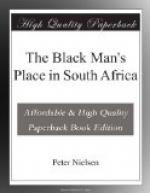The Jews may be cited to show how a separate and peculiar people may be able to live together with other races without either clashing with or being assimilated by these but we must remember that the ethnic difference between the Jews and Europeans are too slight to sustain serious and lasting race-antipathy. Parallelism, when applied to the Native problem of South Africa, is clearly nothing more than the old, plan-less drift continued in the pious hope that human nature will sooner or later change into something better than what it is to-day. But human nature will not change. We must never leave passion out of account. If we recognise love we must recognise hate also as a moving force of mankind. Neither must we overlook vanity and arrogance. The white man, being human, will not cease to be vain and ambitious, he will not cease to feel the hatred that comes from the fear of losing possession of his mates, and possession is the natural man’s definition of love. Where there is a sense of possession there will also be jealousy and hate, and it will only be by securing the white man in his sense of racial integrity that peace and good-will can be made to last.
Territorial separation of the home-life of the two races is the only way by which parallel development can take place. Some of the Native leaders who have opposed this policy have done so in the belief that their people might eventually be able to prove and enforce their claim to full racial equality, but they have not realised that this claim will be denied always on physical grounds, and not on considerations of moral worth. These leaders mean well but they do not see well. Smarting under the pain of their treatment they do not perceive that the real issue is one of unalterable physical disparity.
The hardships and disabilities under which the educated Native suffers in the Northern Provinces of the Union and in Rhodesia are patent and serious. It is hard that a civilised man may not travel in his own country without a “certificate”; it is hard that he must do only rough or menial, but always ill-paid, work when he is capable of doing skilled and well-paid labour; it is hard that when he is allowed to do skilled labour he cannot claim the wages of a skilled labourer; it is hard to be denied always the privileges of a civilised existence for which he has proved himself fit and worthy; it is hard to be treated always as an inferior and an alien in the land of his fathers; all this is hard, but—’tis the law, written and unwritten, made and enforced by the dominant race, and there is no reason to think it will be made less hard as the pressure of black competition increases.




